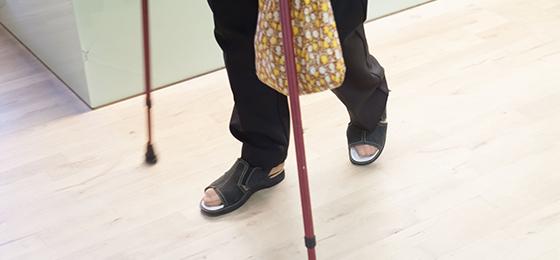06 Interprofessional quality circles improve medication in nursing homes
By stopping or reducing unsuitable medications, the state of health and quality of life of elderly people can be improved. Interprofessional quality circles in old people's and nursing homes promote this “deprescribing”, as the study conducted in 58 old people's and nursing homes in the cantons of Fribourg and Vaud shows.
Project description (completed research project)
After exploratory epidemiological and qualitative analysis, two nested randomized controlled trials took place in 58 nursing homes of Fribourg and Vaud between 2018 and 2019. During a quality circle session organized in each nursing home, pharmacists, nurses and physicians built and implemented a local deprescribing consensus to reduce the use of some inappropriate medications, without decreasing the residents’ safety (i.e. mortality, hospitalisations, use of physical restraints and falls). Seven nursing homes then recruited 62 residents to evaluate the additional effect of individual treatment modification plans, built within the interprofessional team using medication review, on the use of inappropriate medications, participants’ quality of life and safety.
Background
In Switzerland, at least half of the elderly nursing home residents are subjected to overmedication and inappropriate medications. In old people's and nursing homes in the cantons of Fribourg and Vaud, issues related to medication have been dealt with jointly by nursing staff, doctors and pharmacists for several years, which can help to achieve optimal medication safety and effectiveness as well as cost savings on medication. This inter-professional collaboration model was used to investigate the possibilities and limitations of deprescribing.
Aim
The study proposed to develop and validate an interprofessional deprescribing process that will optimise the medication regimen of nursing home residents. It aimed to maximise medication appropriateness and safety. The effects of such a process on residents’ medication, their general health status and their quality of life was analyzed. It also evaluated the financial and organisational feasibility of the process and its acceptance among the persons involved.
Results
The exploratory analysis showed that the prescription of inappropriate medication was an issue in the participating nursing homes and that the participants were in favour of a deprescribing procedure. Thanks to the quality circles conducted in 27 of the 58 participating nursing homes, the use of inappropriate medication tended to be reduced and of proton pump inhibitors was significantly reduced. Deprescribing had no effect on falls and the use of physical restraints, but had unclear effects on hospital stays and mortality. It was also found that medication review led to a reduction in the dosage of inappropriate medications, particularly chronic medications, for 29 residents, but not to a reduction in the number of medications administered. Deprescribing had no influence on medication safety, while the real influence on quality of life remains to be confirmed, probably with more appropriate measurement tools. The intervention was widely accepted and considered feasible by the participants.
Relevance / Application
The development and implementation of multi-level interprofessional procedures for the optimisation of medication in nursing homes seems to make sense. These procedures could also be transferred to other cantons, settings (hospital outpatients) or patient groups (older persons in their own homes). Special attention should be paid to the safety and well-being of patients. Implementation research should be strengthened in order to promote the anchoring, dissemination and evaluation of corresponding procedures in the sense of a self-learning system.
Original title
Opportunities and limits of deprescribing for older people in nursing homes (OLD-NH)

